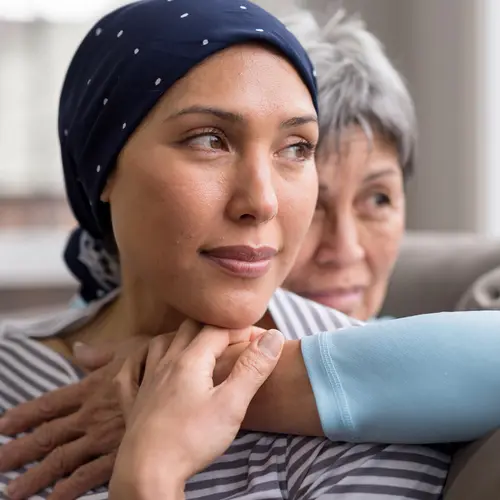Younger women usually don’t think about getting breast cancer. After all, under 7% of all breast cancer cases happen in women under 40. But it can happen at any age, and it’s important to be aware of your risk factors, regardless of your age.
The following put you at higher risk:
- A personal history of breast cancer or some noncancerous breast diseases
- A family history of breast cancer, particularly in a mother, daughter, or sister
- History of radiation treatments to the chest before age 40
- Having a specific genetic defect such as BRCA1 or BRCA2 mutation
- Getting your period before age 12
- For some women, your age when you had your first child
Other risk factors include heavy alcohol use, high intake of red meat, dense breasts, obesity, and race.
Some studies suggest that taking birth control pills in the previous 10 years slightly increases the risk for developing breast cancer. Other studies, however, show no such effect.
Hormone replacement therapy with estrogens and progestins has been linked to a higher risk of breast cancer development.
What Is Different About Breast Cancer in Younger Women?
Diagnosing breast cancer in women under 40 years old is more difficult, because their breast tissue is generally denser than in older women. By the time a lump in a younger woman's breast can be felt, the cancer may be advanced.
In addition, breast cancer in younger women can be aggressive and less likely to respond to treatment. Women who are diagnosed at a younger age also are more likely to have a mutated BRCA1 or BRCA2 gene.
Delays in diagnosing breast cancer can cause problems. Many younger women ignore the warning signs -- such as a breast lump or unusual nipple discharge -- because they believe they’re too young to get breast cancer. They may assume a lump is a harmless cyst or other growth. Some doctors may also dismiss breast lumps in young women as cysts.
Should Women Under Age 40 Get Mammograms?
In general, regular mammograms aren’t recommended for women under 40 years of age, in part because breast tissue tends to be dense, making mammograms less effective. The American Cancer Society recommends women ages 40 to 44 should have a choice to start yearly screening mammograms if they would like. Women ages 45 through 54 should have a mammogram each year and those 55 years and over should continue getting mammograms every 1 to 2 years. Most experts believe the low risk at that age doesn’t justify the exposure to radiation or the cost of mammography. But mammograms may be recommended for younger women with a family history of breast cancer and other risk factors.
What's the Best Way for Younger Women to Screen for Breast Cancer?
The American Cancer Society (ACS) recommends that all women know how their breasts look and feel and report any changes to their doctor. The ACS states that research has not shown a clear benefit of performing regular breast self-exams. Talk with your doctor about the pros and cons of breast self-exam.
Regular breast exams done at least every 3 years by your doctor are recommended for women beginning at age 20. Expert groups don’t all agree when women should start getting mammograms and you should discuss with your doctor what’s right for you. The U.S. Preventive Services Task Force recommends screening every 2 years from ages 50 through 74 and also that the decision to start yearly screening mammograms before age 50 should be an individual one..
Talk to your doctor about when you should begin to have mammograms. For younger women, digital mammography may be an alternate to a standard mammogram. Digital mammography is better able to see abnormalities in dense breast tissue.
How Is Breast Cancer Treated In Younger Women?
Treatment decisions are made based whether or not it has spread beyond the breast, as well as the woman's general health and personal circumstances.
Treatment options include:
Surgery: either a lumpectomy, which involves removing the tumor and some surrounding tissue, or a mastectomy, which is the removal of a breast.
Radiation is generally used following a lumpectomy, and chemotherapy and hormone therapy often are recommended after surgery to help destroy any remaining cancer cells and prevent a return.
Breast cancer treatment can affect your sexuality, fertility, and pregnancy. If you’d like to have children, talk to your doctor before you begin treatment.

